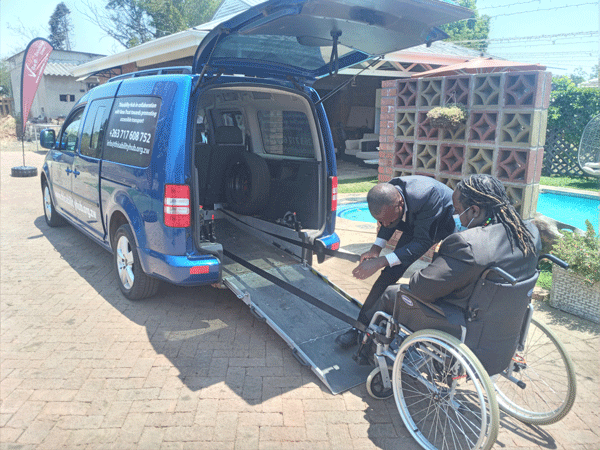
By Kennedy Nyavaya
Local private and public institutions should invest in the provision of more inclusive and accessible transportation for persons with disabilities (PWDs) who are struggling with current modes that do not incorporate their varied needs, experts have said.
According to the National Disability Policy launched earlier this year, PWDs account for 2.3 million of the country’s total population — about 15% — yet some of their needs to move around smoothly are not taken into consideration usually.
Disability advocacy organisation, ThisAbility Hub recently collaborated with Vana Trust to launch the country’s first accessible taxi.
“We came up with this idea in trying to complement government efforts towards transportation as we saw that persons with disabilities are the least considered when it comes to accessible transportation.
“This is our attempt to try and ease the burden in terms of provision of accessible transportation for persons with disabilities in Zimbabwe,” ThisAbility Hub technical director Tapiwa Tsikai told journalists.
The Vaya, an application-based cab service, is designed to carry one wheelchair bound passenger and has many safety features like belts as well as four other seats to cater for more passengers.
Tsikai said they were looking forward to expand the project to ensure that transport is not only accessible but also affordable for the majority of people with disabilities.
- Chamisa under fire over US$120K donation
- Mavhunga puts DeMbare into Chibuku quarterfinals
- Pension funds bet on Cabora Bassa oilfields
- Councils defy govt fire tender directive
Keep Reading
“We hope and pray that bigger players with more resources will be able to come on board and support such initiatives so that we are able to provide accessible transport at a cheaper rate for people with disabilities,” he said.
“We also want donors to subsidize prices. In the near future we intend to acquire more vehicles and service more areas, not just Harare because people with disabilities can be found everywhere across the country.”
Vana Trust founder Nyasha Gwatidzo was hopeful that the pioneering taxi will work as an advocacy tool in demonstrating the need for more affordable as well as user-friendly transportation for persons with disabilities.
“What we are doing is adding value. We are not replacing the transport operations and I am hoping it will raise awareness for people running transport in Zimbabwe to think about a person with disability and how they navigate in daily life,” Gwatidzo.










